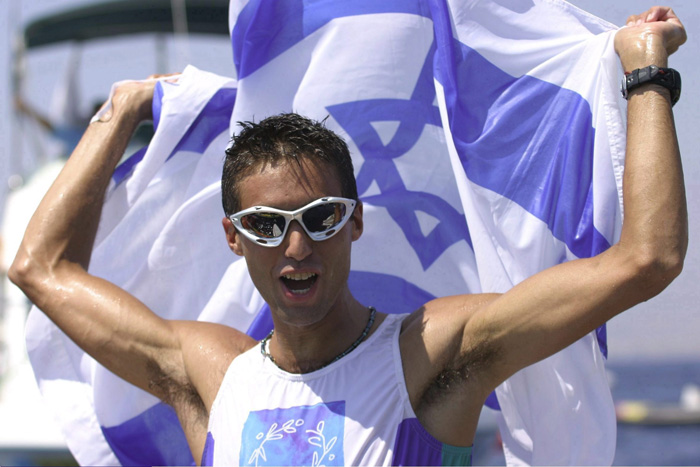Australia/Israel Review
Israel’s field of dreams
Jul 7, 2016 | Amotz Asa-El

Amotz Asa-El
It had taken 44 years, but in 1992 Israel finally won its first-ever Olympic medal when judoka Yael Arad took silver in the Barcelona Games’ half-middleweight competition.
It was a modest, but memorable, turning-point in the unsung sporting history of a young and small country with much more urgent worries than its athletes’ achievements. Still, ever since the 1952 Helsinki Games, Israel has made sure to compete in the Olympics (except the widely boycotted 1980 games in Moscow), and its overall athletic pursuits have since developed in tandem with, and as an intriguing reflection of, the Jewish state’s social evolution.
From 1952 onward, up to the present day, Israelis watching the impressive Olympic achievements of relatively small countries like Greece, Finland, or New Zealand, have argued that their failure to match such performances reflects the need for Israeli young people to undertake extensive military service just as they are at their physical prime.
This is particularly noticeable in soccer. Though it is Israel’s most popular sport, with more than 100,000 fans flocking to weekly league games, Israel has repeatedly failed to qualify for the European Championship and the World Cup (except in 1970, after defeating Australia).
However, in the 1960s a little noticed development happened not in soccer, but in basketball. An American Jew who had just been drafted by the NBA’s Baltimore Bullets was persuaded to play one season in Israel before proceeding to the world’s best league.
The player, a handsome centre named Tal Brody, soon became a major celebrity in Israel and fell in love with the team that hired him, Maccabi Tel Aviv. Now 70 and an Israeli for more than half-a-century, he gave up that NBA career and says he never regretted that decision. Israel certainly didn’t.
Brody led his team, and the Israeli national squad, to impressive performances in European tournaments. And then, when he was already 35 and in the twilight of his career, he led Maccabi Tel Aviv to the European title. It was 1977, and the path he pioneered had by then become a major thoroughfare.
Maccabi Tel Aviv conquered Europe while fielding, in addition to Brody, Harvard law graduate Lou Silver and future Tel Aviv University English Literature Professor Bob Griffin. By then the entire Israeli league was flooded with American Jews who were teaching native Israelis the American way of playing basketball, decades before there was cable TV in Israel.
By the 1980s, Israel was a basketball power in Europe, a status it enjoys to this day. Meanwhile, yesteryears’ geographic traffic is now two-way, with Israeli forward Omri Caspi starring in the NBA for the Sacramento Kings.
American Jews have excelled in many sports, from baseball, where Sandy Koufax is recalled as one of the best pitchers in history, to swimming, where Mark Spitz won multiple Olympic gold medals – but they mostly stayed in America.
Soviet Jews, however, moved to Israel, and have brought excellence in fields where Israelis had never dreamed of participating.
Siberian-born pole vaulter Alex Averbuch – now a city councilman in the coastal town of Netanya – won the European gold medal twice last decade and also received the silver medal in the world championships. Though he didn’t win an Olympic medal, his personal best – 5.92 metres – made him one of the best pole vaulters in the world.
Even more exotically for Israel, figure skaters Gali Chait and Sergei Sakhnovski reached international stardom, winning a bronze medal in the 2002 world championship while skating to Israeli tunes.
However, with all due respect to these immigrant athletes, the judoka who won that first Olympic medal was born and raised in Tel Aviv, as were all the six medalists who followed her except one – Uzbek-born kayaker Mikhail Kalganov who won the 500m men’s-singles bronze in the 2000 Sydney Games.
The other five were not only Israeli-born, but also represented between them the Israeli penchant for finding niches where Israelis can have a relative advantage. What Israeli business has found in hi-tech and innovation, those medalists found in judo and sailing.
Judo, it turned out, is suitable for Israelis who find its combination of agility and calculation challenging, and sailing is suitable due to Israel’s many beaches and sunny days.
The investments of the Israeli sporting establishment in these fields soon bore Israel’s first, and so far only gold medal, when Gal Friedman, who had been surfing in the Mediterranean off Caesarea since age nine, won his Mistral windsurfing class at the 2004 Athens Games.
At next month’s Rio Games, Israel will be fielding seven judokas and six sailors, in addition to 32 athletes in 12 more fields, from swimming to cycling. These include marathon-runner Daniel Guadi, whose family of eleven moved to Israel from Ethiopia when he was nine, and gymnast Alex Shatilov, a European champion on the floor apparatus who reached Israel from Uzbekistan at age 13. Israeli officials hope this delegation will generate one to two medals – as well as a group medal in women’s rhythmic gymnastics.
Yet there is one aspect of sport that is not recognised as an Olympic sport, but in which Israelis have also begun to excel: sporting entrepreneurship.
The imagination and resolve that Israeli investors and inventors have displayed in fields like computers, agronomy, and pharmaceuticals emerged in Israeli basketball last year – rebooted thanks to an improbable move by a computer engineer.
The son of a sculptor and a journalist from the Jerusalem suburb of Mevasseret Zion, Ori Allon earned a computer science PhD at the University of New South Wales and then created the algorithms that fueled search engines that he conceived – and Google and Twitter subsequently bought.
Now a millionaire, he remained a fan of Hapoel Jerusalem, the club he cheered as a child. So he bought it and generously endowed it, leading it last year to its first-ever national championship, to the delirium of 11,000 fans who filled the new Jerusalem Arena.
A similar feat was repeated last month down south, only more impressively, in soccer.
After her husband made a fortune by creating a venture-capital fund that invested in CheckPoint, today an IT security giant with US$1.6 billion in annual sales, Alona Barkat bought a Second Division soccer club that represented Beersheba, in the Negev Desert.
It took her a decade, but last month Ms. Barkat’s team won the Israeli championship, to the eruption of the 16,000 fans who filled its stadium to capacity, mostly dressed to match the red-and-white uniforms of their heroes.
In terms of sport, it was a well-deserved culmination for a diligent squad that lost only three matches in the entire season, and also emerged undefeated from a record 25 consecutive games – thus evoking comparisons with Leicester, this season’s Cinderella in the English premier league.
Yet the tale of Hapoel Beersheba transcends sport – blending social triumph and a frontierland’s can-do spirit with a feminine touch.
Like Israel’s leading soccer clubs in recent years, Beersheba’s was also bought by a private investor. However, other teams were bought by hard-nosed businessmen, as might befit a masculine industry of male players who play for predominantly male fans in soccer stadiums infamous for their machismo culture.
Hapoel Beersheba, however, was bought by a petite mother of three who set out to defy this culture.
Using the philanthropic fund she established with part of her husband’s young fortune, Barkat paid NIS 8.7 million (currently ~A$3 million) for the team that two years later climbed into the First Division, after having made several smart purchases.
Yet in addition to buying good players, Barkat also turned the club into a social engine, investing in a soccer school for children and in the team’s communal outreach. When fans attacked the coach after a bad game, Barkat got them to apologise by threatening to resign.
Gradually, Hapoel Beersheba’s games became happenings attracting entire families – including not only working-class fans but professors from the local Ben-Gurion University and surgeons from the nearby Soroka Hospital. The result was Israel’s best-behaved soccer audience: one which actively silenced those supporters who engaged in the characteristic habit of soccer fans of loudly cursing the referee.
The team’s gospel of tolerance was helped by its deployment of a colourful collection of Jewish, Muslim and Christian players, and the confusing mélange in the stands of the Hebrew of native Israelis, the Russian of recent immigrants, and the Arabic of fans from surrounding Bedouin towns.
“We came to Beersheba,” said Barkat, referring to her Foundation, “because we believed that through soccer we will spark social change; I want Beersheba’s kids to know that dreams can come true.”
In a sense, that field of dreams encapsulates the story of Israeli sport.
Tags: Israel






